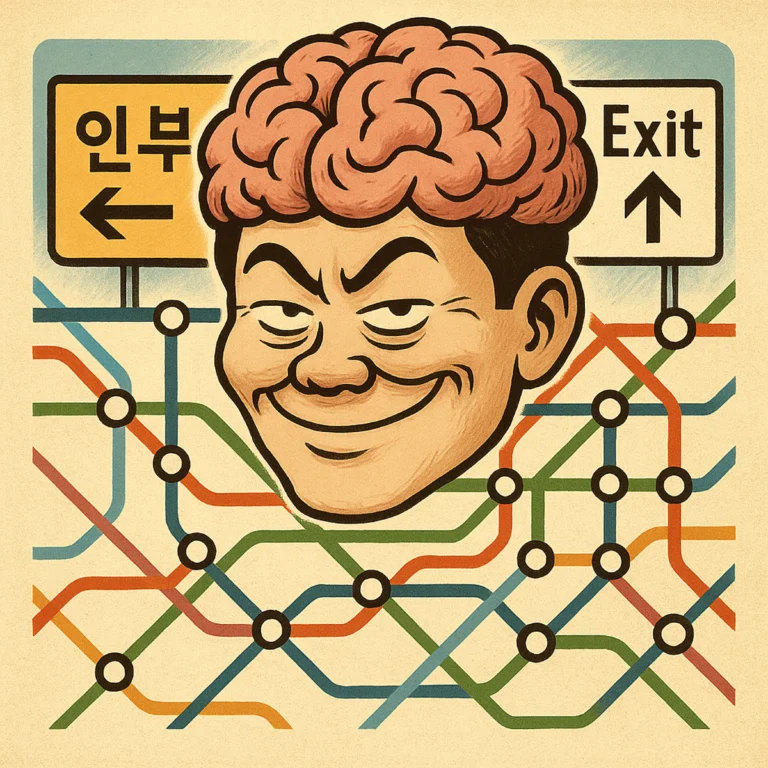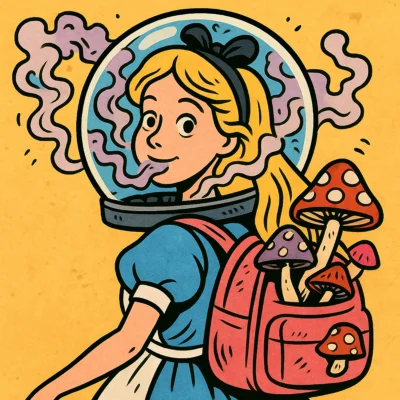Let’s be honest: Drugs are expensive. From the cheapest cigarette, which I’m not allowed to consume thanks to my wife, to the most expensive drug which is what and costs how much I don’t know, once you become addicted, they not only harm your physical and mental health but also your budget, so much so that depending on the drug you chose, you might need to sell a kidney or both – if you can survive without one somehow.
Korea has a long history of drug and alcohol addiction. Years of foreign rule, first of Chinese, then of Japanese, and in the end, albeit indirectly, American, all the abuses of these foreigners, on both men and women of all ages, left wounds partly healed but the scars remain. “It’s not that bad, if you think of it” a Korean friend once told. “It’s like the buildings untouched in Beirut: They remind us of what had happened, and give us the will and courage so that they won’t happen ever again”.
You may call her the Korean version of Pollyanna, but finding good in such bad needs to be appreciated, I believe.
What was I saying? Oh, yes, drug addiction. Koreans, especially after the “civil war” needed to lick their own wounds to progress, for it was to be them and only them to fix what’s broken and build what’s razed to the ground. Families were separated, brothers killed each other, houses were razed as were factories, fields were burned and hunger and famine ruled for years. Not one person had a healthy psychology, neither it’d be fair to expect. Some, actually many found the way out in drugs and alcohol. Don’t blame, don’t look over: Even Atatürk, one of the smartest and the most iron-willed people in history found refuge in alcohol. It happens – it’s not nice, but it’s what it is.
It’s written in the chronicles that Park Chung-hee once told his assassin, who meanwhile was his closest friend and the most reliable man, that one reason of the coup was fighting drug addiction as the democratic government failed to do so.
One thing is certain: Military rule, except foreign rule, is worse than even the most totalitarian state like that of Hitler Germany – not because it’s any good but because of many reasons, one being, as the famous saying goes, “the state is always 18 years old”: It’s the soldiers that follow the orders and soldiers are trained to kill – even their own people if need be. Opposing Hitler is one thing, opposing a general that gives orders to 18-20 year olds is another.
Though there’s one good thing about military regime: Once it’s determined to do good, and if it really aims and tries to do good, nothing and no one can stand against them. It’s no surprise that all benevolent dictators like Atatürk were soldiers: They dictated, yet dictated for the good of the people and against the will of them. For this is a highly controversial topic, I won’t go on with it but return to the actual topic at hand.
A decade after the armistice began the military rule and, as I quoted above, the war against drug and alcohol addiction did at the same time. The solution, according to this once soldier, was simple: Working harder and harder every day so that the bodies were to be so tired to feed the brain sugar, which then lacked the means to think of the wounds of the past. You know what? It worked. The general was happy: Folk wasn’t able to think about politics either. What more would such strongman want?
One can win the war against humans, even their fellow citizens, but no one can win against nature. The general died, another soldier replaced him but what was to happen happened: Korea became a democracy, and a good one at that. No ill is without good and no good is without ill: Soon after the switch to democracy, drug abuse restarted.
Unable to apply the same measures, the elected and million light years more legitimate government thought: We would better not free drug consumption totally, but let the people experience how it feels. Hence was opened the LSD Museum, of which the address I won’t share here but some photos from, so that you’ll get to know about not only Korea’s solution but also what drugs do to people.

Probably the most interesting of all museum entrances, you are not welcomed but are threatened once you dare stepping in. This is the foyer and few steps after this line you’re welcomed by someone familiar:

An alien? An astronaut? No, dear reader, neither. This is Alice, looking for a rabbit hole to fall and you know the rest. Her helmet is a special one so that she can breathe weed 24/7, and in her backpack are mushrooms findable in many cafes in Amsterdam.
The rabbit? Here he is:
What the rabbit does is different in this part of the world, yet it is visualized below:

You smiled too, I know. That’s what the artist is after.
Once you’re smile bombed, there are corners of the museum waiting for you to discover. Once you’re done, you proceed to the end of the corridor:

“Einstein told us that there are four dimensions, but there actually are five. Only a lucky minority come to realize it”. My wife enjoys the fifth dimension in the photo above. I tried, yet failed. Seems I needed something stronger.
After the corridor is a small room which, by no means, is explainable by my words – hence I leave explaining to the artist himself (or herself):

“When the exploitation of nature for productivity and development started, mankind’s need became the only reason for their existence in the modern world. The production of ornamental plants is the result of what mankind wants to see in nature.
I give the audience time for contemplation through a special space made of artificial plants and light. My work is a combination of a modern advertisement board and a style of an oriental garden. The natural scenery with different tones of shadows that seems as if they are alive through the morning mist is witnessed by the audience. This place contains paradoxical meaning that sometimes rest is forced in a virtual system. Through a strong transmitted light, the landscape created seems lyrical. These landscapes become a healing garden that purifies the insides of the audiences with artificial forces.
Metonymic nature and life are expendables, subject f reserch and becomes another aspect of society of consumption. Likewise, plants that are fit to be made of the human world becomes a being that comforts and satisfies human desires in a society centred around human perspectives. Also as a being that changes the environment, it leaves an afterimage that cannot be clearly defined and spreads its hidden power through our society.”
What happens after this room? Sadly I can’t tell for I don’t remember either. There was some smell in the air, I have no idea what it was, and neither my brain nor my camera has a record of following two hours. My wife claims that she remembers some things but I’m not sure that she’s telling the truth. Share, if you do. No?
By the way, drugs are illegal in Korea, don’t try to use them – rather visit the LSD Museum. I didn’t want to share the address of the one we visited for my two hours there is lost, yet I’m sure any Korean will tell you where it is – and you can have the best experience without the risk of substance addiction. What more could you want?

